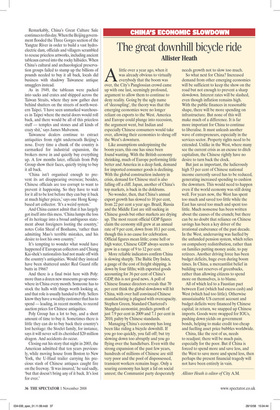The great downhill bicycle ride
Allister Heath
Alittle over a year ago, when it was already obvious to virtually everybody that the boom was over, the City’s Panglossian crowd came up with one last, seemingly profound, argument to allow them to continue to deny reality. Going by the ugly name of ‘decoupling’, the theory was that the emerging economies were no longer reliant on exports to the West. America and Europe could plunge into recession, the argument went, but Indian and especially Chinese consumers would take over, allowing their economies to shrug off the West’s downturn.
Like assumptions underpinning the boom years, this one has since been found wanting. With the British economy shrinking, much of Europe performing little better and America in a deep funk, demand for imported consumer goods is declining. With the global construction industry in crisis, demand for Chinese steel is also falling off a cliff. Japan, another of China’s top markets, is back in the doldrums.
No wonder, then, that China’s annual export growth has slowed to 10 per cent, from 22 per cent a year ago. Brazil, Russia and the Middle East are still sucking in Chinese goods but other markets are drying up. The most recent official GDP figures claim the economy still grew at an annual rate of 9 per cent, down from 10.1 per cent, though this is no cause for celebration. Official figures mean little; come hell or high water, Chinese GDP always seems to grow in a range of 9 to 12 per cent.
More reliable indicators confirm China is slowing sharply. The Baltic Dry Index, a gauge of the cost of freight shipping, is down by four fifths; with exported goods accounting for 36 per cent of China’s GDP, this is not good news. A poll of Chinese finance directors reveals that 70 per cent think the global slowdown will hit China, with over half convinced Chinese manufacturing is plagued with overcapacity. Stephen Green, Standard Chartered’s Shanghai economist, predicts growth of just 7.9 per cent in 2009 and 7.1 per cent in 2010, paltry by Chinese standards.
Managing China’s economy has long been like riding a bicycle downhill. If you go too quickly, you fall off; but try slowing down too abruptly and you go flying over the handlebars. Even with the strong expansion of the past few years, hundreds of millions of Chinese are still very poor and the pool of dispossessed, transient workers remains huge. Only a soaring economy has kept a lid on social unrest; the Communist party desperately needs growth not to slow too much.
So what next for China? Increased demand from other emerging economies will be sufficient to keep the show on the road but not enough to prevent a sharp slowdown. Interest rates will be slashed, even though inflation remains high. With the public finances in reasonable shape, there will be more spending on infrastructure. But none of this will make much of a difference. It is far more important for China to continue to liberalise. It must unleash another wave of entrepreneurs, especially in the services sector. Property rights need to be extended. Unlike in the West, where many see the current crisis as an excuse to ditch capitalism, the Chinese rightly have no desire to turn back the clock.
But just as important, the ludicrously high 53 per cent of Chinese national income currently saved has to be reduced, generating increased spending to cushion the downturn. This would need to happen even if the world economy was still doing well. For years now, the West has spent too much and saved too little while the East has saved too much and spent too little. Much nonsense has been written about the causes of the crunch; but there can be no doubt that reliance on Chinese savings has been a key driver of the irrational exuberance of the past decade. In the West, undersaving was fuelled by the unfunded pension system, which relies on compulsory redistribution, rather than on families putting money aside, to pay retirees. Another driving force has been budget deficits, huge even during boom times. In China, a mercantilist belief in building vast reserves of greenbacks, rather than allowing citizens to spend more on themselves, is to blame.
All of which led to a Faustian pact between East (which had excess cash) and West (which had too little). Otherwise unsustainable US current account and budget deficits were financed by Chinese capital; in return, we snapped up Chinese imports. Goods were swapped for IOUs, pushing down yields on government bonds, helping to make credit too cheap and fuelling asset price bubbles worldwide.
China, like the rest of us, needs to readjust; there will be much pain, especially for the poor. But if China is forced to spend more and save less, and the West to save more and spend less, then perhaps the present financial tragedy will not have been entirely in vain.


































































































 Previous page
Previous page